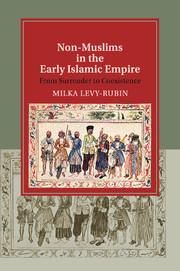Book contents
- Frontmatter
- Contents
- Illustrations
- Preface
- Introduction
- 1 The Roots and Authenticity of the Surrender Agreements in the Seventh Century
- 2 Shurūt ʿUmar and Its Alternatives
- 3 The Date and the Ideology of the Ghiyār Code
- 4 The Enforcement of Shurūt ʿUmar
- 5 The Provenance of the Modes of Subordination of Non-Muslims
- Conclusion
- Appendix I Al-Turtūshıī’s Version of Shurūt ʿUmar
- Appendix II Al-Shāfiʿıī’s Version of the Pact to Be Accorded to Non-Muslim Subjects
- Notes
- Glossary
- Bibliography
- Index
1 - The Roots and Authenticity of the Surrender Agreements in the Seventh Century
Published online by Cambridge University Press: 05 January 2012
- Frontmatter
- Contents
- Illustrations
- Preface
- Introduction
- 1 The Roots and Authenticity of the Surrender Agreements in the Seventh Century
- 2 Shurūt ʿUmar and Its Alternatives
- 3 The Date and the Ideology of the Ghiyār Code
- 4 The Enforcement of Shurūt ʿUmar
- 5 The Provenance of the Modes of Subordination of Non-Muslims
- Conclusion
- Appendix I Al-Turtūshıī’s Version of Shurūt ʿUmar
- Appendix II Al-Shāfiʿıī’s Version of the Pact to Be Accorded to Non-Muslim Subjects
- Notes
- Glossary
- Bibliography
- Index
Summary
The early surrender agreements made between the Muslim conquerors and the non-Muslim inhabitants of the conquered cities are a common feature throughout early Muslim historiographic and legal literature. Surrender agreements are often mentioned, and at times cited in full, by al-Balādhurıī, al-Tabarıī, al-Yaʿqūbıī, Ibn Aʿtham al-Kūfıī, Ibn ʿAbd al-Hāakam, Abū Yūsuf, Abū ʿUbayd, and Yahyā b. Ādam; they are also mentioned sporadically in many other compositions.
These agreements have been studied by various important scholars, from numerous points of view. The main claim against the authenticity of the surrender agreements lies in the fact that some of the agreements cited by Muslim authors are detailed and comparatively long documents. They include not only general conditions concerning payment or taxation on the side of the conquered and the obligation of protection of people, property, and prayer-houses, but in fact many intricate details regarding arrangements concerning public matters as well as people’s rights and property. The agreements are written, witnessed, and signed – usually by the commander of the Muslim army – and at times are reported to have been sealed. They seem to be too complex and versatile for conquerors who had recently emerged from the desert and were not yet sure of their position in regard to the conquered population. Thus Fattal believes that the early agreements were rather succinct and undetailed. According to this view, some of these agreements were made verbally, and it is doubtful whether many of them were in fact written down at the time of the conquest.
- Type
- Chapter
- Information
- Non-Muslims in the Early Islamic EmpireFrom Surrender to Coexistence, pp. 8 - 57Publisher: Cambridge University PressPrint publication year: 2011



